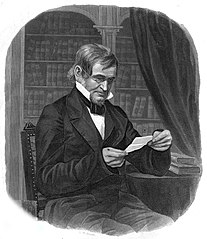
Worcester’s Dictionary. —The chief rival to Webster’s, Worcester’s was preferred by many American writers through most of the nineteenth century. Worcester was more conservative; Webster began the tradition of confrontationally populist lexicography that is still maintained by his successors at Merriam-Webster. Worcester’s assumption was that good English was the same on both sides of the Atlantic; Webster encouraged the development of a distinctly American language.
A Dictionary of the English Language by Joseph E Worcester, LL.D., with supplement, containing over 12,500 new words and entries, and a vocabulary of synonymes of words in general use. London: Frederick Warne & Co., 1884. —This carries an American copyright notice from J. P. Lippincott for 1881, so it is probably an English reprint of that edition.
A Universal and Critical Dictionary of the English Language, to which are added Walker's Key to the pronunciation of classical and scripture proper names, much enlarged and improved; and A pronouncing vocabulary of modern geographical names. By Joseph E. Worcester. Boston: Wilkins, Carter, and Company, 1847.
A Comprehensive Pronouncing and Explanatory Dictionary of the English Language, with vocabularies of classical, scripture, and modern geographical names. Revised, with important additions. Boston: Hickling, Swan, and Brewer; Cleveland: Ingham and Bragg, 1858.
A Dictionary of the English Language. By Joseph E. Worcester, LL.D. Boston: Hickling, Swan, and Brewer, 1860.
The Century Dictionary, 1889-1895. —Certainly the most ambitious work of lexicography America ever produced. It’s an alternate-universe dictionary, which includes much of what other dictionaries banish to the encyclopedia.Vol. I: A to Celticism, Kelticism
Vol. II: Celticize to drool.
Vol. III: droop to gyves.
Vol. IV: H to lyverey.
Vol. V: M to pharmacolite.
Vol. VI: pharmacological to salse.
Vol. VII: salsify to technical.
Vol. VIII: technicality to Zyxomma.
Etymological and Pronouncing Dictionary of Difficult Words. By the Rev. E. Cobham Brewer. London: Ward, Lock, &Co., [1882]. —“The object of this Dictionary is not to collect together all the words employed in the language, nor to furnish an exhaustive list of the several meanings of each word, but simply to call attention to errors of speech and spelling made, not by the uneducated, but by those who wish to speak and spell correctly.”
Supplementary English Glossary, by T. Lewis O. Davies. London: George Bell & Sons, 1881. —It began as a series of notes on slips of paper stuck in a copy of Halliwell (above), but Mr. Davies decided to publish when he reached more than seven hundred printed pages’ worth of supplementary notes. “I determined then not to confine myself to archaic and provincial words, which were what Mr. Halliwell undertook to register, but to insert any expressions, whether old or modern, which were not in the best existing Dictionaries.”An Etymological Dictionary of the Scottish Language. By John Jamieson, D.D. Edinburgh, 1808. —In effect a Scottish-English dictionary, the definitions being given in standard English.
A
Concise Dictionary of Middle English from A.D.
1150 to 1580. By the Rev. A. L. Mayhew
and the Rev. Walter W. Skeat. Oxford, 1888.
Universal Pronouncing Dictionary of Biography and Mythology, by J. Thomas, 1915 (the fourth edition). —This is the book you need when you want the real English pronunciations of foreign names like Haydn (pronounced Hā-dn rather than Hī-dn).
Blackguardiana; or, a Dictionary of Rogues, Bawds, Pimps, Whores, Pickpockets, Shoplifters, Mail-Robbers, Coiners, House-Breakers, Murderers, Pirates, Gipsies, Mountebanks, &c., &c. Credited by the librarian to James Caulfield, 1793.
A Vocabulary of Criminal Slang, with some examples of common usages. By Louis E. Jackson. Assisted by C. R. Hellyer, City Detective Department, Portland, Oregon. Portland: [Published by the author], 1914.
The Slang of Venery and Its Analogues. Compiled from the works of Ash, Bailey, Barrere, Bartlett, B.E., Bee, Cleland, Cotgrave, Dunton, D’Urfey, Dyche, Egan, Farmer, Florio, Grose, Halliwell, Harman, Johnson, Mayhew, Matsell, the Lexicon Balatronicum, and other sources. Chicago: Privately Printed, 1916. —Set from typewritten pages.
[Volume III.] Synonyms of the Slang of Venery. Collected from The Slang of Venery and Its Analogues.
Hepcats Jive Talk Dictionary. Edited by Lou Shelly. Derby (Connecticut): The T. W. O. Charles Company, 1945.
Dictionary of Phrase and Fable. Giving the derivation, source, or origin of common phrases, allusions, and words that have a tale to tell. By the Rev. E. Cobham Brewer. London, New York, Toronto, Melbourne: Cassell and Company, [1922].